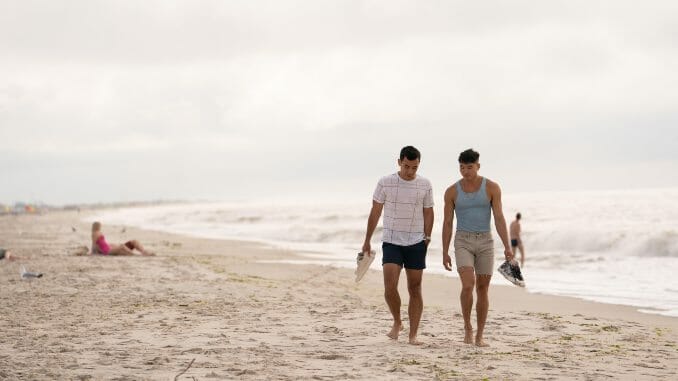Fire Island Is Modern Jane Austen Done Right (And Gay)

From its opening moment, Fire Island ensures its viewer is aware that it is a Jane Austen adaptation. In voiceover, Noah (Joel Kim Booster) recites Pride and Prejudice’s first line, and even goes as far as to show us a copy of the book lying conspicuously on his bedside table. Fire Island loosely follows the structure of this oft-adapted source material, centering fun-loving and stubbornly independent Noah (mirroring the sharp and brazen Elizabeth Bennet) as he accompanies his friends to the country’s ultimate gay-hub, Fire Island. There, he meets his sullen and irritable Darcy, Will (Conrad Ricamora), and the two engage in a delightful love-hate, will-they-won’t-they relationship. Meanwhile, Noah’s best friend Howie (Bowen Yang) falls into a too-good-to-be-true romance with Charlie (James Scully): Jane Bennet and Charles Bingley. Of course, Fire Island comes with a notable twist. Director Andrew Ahn has transformed a story deeply rooted in heteronormative standards and ideals into one about the gay experience. The epicenter of the film lies in its characters’ sexualities, from discussions about the unique struggle of gay Asian invisibility to refreshingly candid conversations regarding the minutiae of their sex lives.
Pride and Prejudice is an excellent prototype for this particular story; it lays the groundwork for a multitude of relationship dynamics, and its classic structure demands that the film question the familiar rom-com norms that the novel presents. Why is the only acceptable climax in a romance a theatrical, over-the-top declaration of love? Why are preferences of non-monogamy, or a fear of commitment, so often deeply frowned upon?
Noah treasures his freedom, Howie yearns for a real fairytale ending. Noah tenaciously pushes back on what Howie refers to as a “pre-9/11 sprint through an airport.” He believes those kinds of gestures don’t exist in real life and that we’re better off without them; that the pedestal society places them on excludes those who seek out relationships that don’t fit their convention. So, when Howie falls for Charlie, one can’t help but wonder how this whole thing will end. On the one hand, we want Howie to get his fairytale ending, but on the other…would that not go against the principles of Fire Island, espoused by writer/star Booster?
-

-

-

-

-

-

-

-

-

-

-

-

-

-

-

-

-

-

-

-

-

-

-

-

-

-

-

-

-

-

-

-

-

-

-

-

-

-

-

-








































